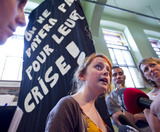
2010-06-29
‘For us it’s not violence,’ spokesperson says of G20 vandalism
Andrew Chung
MONTREAL—Organizers of a large mass of G20 protesters from Montreal say Quebecers were targeted by police.
They also make no apologies for the broken windows and other mayhem that all but overshadowed the meeting of world leaders, describing it as a form of expression.
“For us it’s not violence,” said Mathieu Francoeur, a spokesperson for the Anti-Capitalist Convergence, a group of Montreal social activists and anarchists that organized buses for about 450 to Toronto. “It’s a means of expression and doesn’t compare to the economic and state violence we’re subjected to.”

The “smashing that happened in Toronto,” he explained, was against symbols of capitalism.
“I think the message is clear,” added Danie Royer, another spokesperson. “If people take back the streets, if people attack symbols of capitalism, I think this is the message.”
The group would not say how many among them took part in the upheaval but denounced the “unprecedented” summit police action at a press conference in Montreal on Monday.
They announced a rally would be held in Montreal on Canada Day to protest the use of force.
Their beliefs about the violence might play a role in the fact that many of their compatriots were arrested by police over the weekend.
One university student, who would identify herself as only Camille, said her cell in the makeshift detention centre on Eastern Ave. held 20 people, all women, and all but one was from Quebec.
The group’s organizers don’t know how many Quebecers were arrested, but about 300 of the 450 did not return on the buses. About 1,000 Quebecers went to Toronto, they estimate.
Organizers say police specifically targeted them.
“Everybody that was in the streets that talked French or even cars that had Quebec plates were arrested,” Royer said.
The majority of those picked up at a U of T gymnasium on Sunday were Quebecers. “They came to get the people from Quebec,” Royer declared.
Police vehemently dispute the allegation. “There was no targeting of any type of group,” said Sgt. David Woodford, spokesperson for the G20 Integrated Security Unit. “We didn’t know where a lot of these groups showed up from.”
Some activists complained of “unjustified” confrontations with police.
Shortly after arriving in Toronto late Friday at Ryerson University, the activists say, police showed up, rifling through bags and demanding identification.
Camille said she was arrested Sunday morning along with two others while in their car on College St. as they made their way to a protest at the detention centre. Still far from the site, police stopped them without giving a reason.
They were arrested, allegedly for “breaching the peace” and released without charge after nine hours in jail.
Quebec’s possible outsized role in the protests stems from a well-organized anti-authoritarian movement here.
Anti-war demonstrations tend to be much larger in Montreal than other Canadian cities, as are labour protests, in part because far more Quebecers belong to unions than elsewhere in the country.
Strands of anarchist thought are also ever present. Last month there was the 11th annual Anarchist Book Fair, touted as the biggest anarchist event in North America, as well as an anarchist theatre festival.
“It’s clear that in North America, Quebec and Montreal are kind of known for having a dynamic and lively anarchist network,” said Francis Dupuis-Déri, professor of political science at the University of Quebec at Montreal.